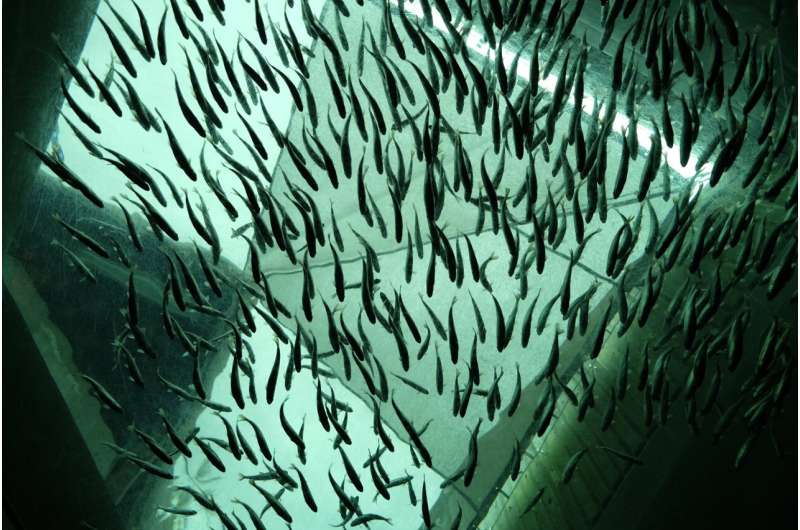This article has been reviewed according to Science X's editorial process and policies. Editors have highlighted the following attributes while ensuring the content's credibility:
fact-checked
trusted source
proofread
Anticipating obsolescence: The next step to enhancing the sustainability of aquaculture

With growing concerns about the environmental toll of single species fish farms, a research project has been looking at the feasibility of introducing a more sustainable and potentially more profitable method of fish farming, using three complementary species.
Much as native American people planted squash, maize and climbing beans together to benefit each other, (often called the "three sisters"), farming finned-fish, shellfish and seaweeds together could benefit each other and reduce any environmental effects of fish farming. Small scale integrated multi-trophic aquaculture (IMTA), as the system is called, has traditionally been used at a small domestic scale in Asia, providing the farmer with more than one product to sell or use.
The feasibility study conducted by Bangor University and published in Ecological Modelling has identified the locations around the Atlantic coast which would be most suitable for IMTA, based on farming salmon, blue mussels and Oarweed, a type of kelp seaweed commonly found in temperate Atlantic coasts. The research considered the natural distribution of the three species, whether suitable locations clashed with busy shipping lanes or marine protected areas and whether there was close access to sizeable ports in order to reach markets.
The western coast of Lewis in the Outer Hebrides, Scotland; Lough Swilly in County Donegal, Ireland, and the western coast of Brittany, northwest France were found to be the best locations to further develop IMTA based aquaculture.
As Conchúr Hughes of Bangor University's School of Ocean Sciences explained, "One of the problems with the type of single species aquaculture practiced in Europe is that excess food and feces can lead to deterioration of local ecology, while density can mean that aquaculture companies need to use antibiotics and other additives to maintain a healthy fish-stock.
"Mussels are filter feeders, they can be responsible for removing up to 54% of salmon waste materials from the water column, using it as energy to grow, while the oarweed removes soluble nutrients from the water column. Oarweed can then be farmed to use in a variety of products, from food supplements for human consumption or for fish farms, as a fertilizer or as an ingredient in pharmaceuticals.
"Each of these species complements the other and mitigates against problems."
IMTA-based aquaculture
Both salmon and mussels are important food sources in Europe, and while oarweed is not as yet, this is a sector that is expected to experience a rapid increase in demand in the coming years- and can provide an alternative sustainable source of fertilizer and other products.
Seaweed cultivation can also provide environmental benefits. The seaweed in the water acts as a buffer against wave energy as it approaches the shore, reducing the energy as it passes through the seaweed, much as trees act as a buffer against strong winds, which can help reduce erosion. It also elevates the pH and oxygenates the water.
More information: Conchúr Hughes et al, Habitat suitability modelling for an integrated multi-trophic aquaculture (IMTA) system along Europe's Atlantic coast, Ecological Modelling (2023). DOI: 10.1016/j.ecolmodel.2023.110459
Provided by Bangor University
















